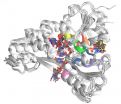(Press-News.org) Bethesda, MD (Sept. 10, 2015) --All colorectal cancer patients should undergo tumor testing to see if they carry Lynch syndrome, the most common inherited cause of colorectal cancer, according to a new guideline1 published in Gastroenterology, the official journal of the American Gastroenterological Association.
"Approximately 50,000 Americans are expected to die from colorectal cancer this year, and hereditary syndromes account for a small, but important fraction of those diagnoses," said Joel H. Rubenstein, MD, AGAF, lead author of the guideline, research scientist at the Veterans Affairs Center for Clinical Management Research and associate professor, division of gastroenterology at the University of Michigan Medical School. "The majority of patients with Lynch syndrome are unaware that they have the syndrome. The AGA recommendation for tumor testing in all newly diagnosed cases of colorectal cancer to identify Lynch syndrome could be considered as a process measure to ensure that patients are receiving the highest quality of care."
AGA developed the guideline using Grading of Recommendations Assessment, Development and Evaluation (GRADE) methodology and best practices as outlined by the Institute of Medicine. The recommendations on the diagnosis and management of Lynch syndrome follow; review the full guidelines for information on the strength of the recommendations.
Population
Intervention
Patients with a family history suggestive of Lynch syndrome, but no personal history of cancer
Offer patients the option of risk prediction modelling for testing, rather than doing nothing.
Patients with a family history suggestive of Lynch syndrome, but no personal history of cancer
Offer patients the option of risk prediction modelling for testing, rather than proceeding directly to germline testing.
Patients with colorectal cancer
Test tumor either with immunohistochemistry (IHC) or for microsatellite instability (MSI). Lynch syndrome tumors display high MSI.
Patients with colorectal cancer with IHC absent for MLH1, approximately 75 percent of whom will have sporadic cancers rather than Lynch syndrome
Test tumor for BRAF mutation or hypermethylation of the MLH1promoter; if patient has neither, conduct germline testing for Lynch syndrome.
Patients with Lynch syndrome
Surveillance colonoscopy, rather than doing nothing.
Patients with Lynch syndrome
Perform surveillance colonoscopy every one to two years versus less frequent intervals.
Patients with Lynch syndrome
Offer aspirin as cancer chemoprevention.
Colorectal cancer is the second leading cause of cancer death in the U.S. Approximately 30 percent of persons diagnosed with CRC have a family history of the disease, and 5 to 6 percent have mutations that are diagnostic of a known hereditary cancer syndrome. Lynch syndrome is the most common inherited cause of colorectal cancer. Approximately 700,000 Americans have Lynch syndrome, and children have about a 50 percent chance of inheriting the disorder. However, the majority of people with Lynch syndrome don't know that they have it. People with Lynch syndrome have a mutation of the MMR gene, which means that their bodies are less able to fix errors in the DNA. While not all people with Lynch syndrome will develop cancer, a person who has the mutation is more likely to get certain types of cancer, including an 80 percent higher risk of colorectal cancer and a 60 percent higher risk of endometrial cancer.
Read the technical review.2 AGA also offers a Clinical Decision Support Tool and a patient guide3 for the Lynch syndrome guideline.
About the AGA Institute
The American Gastroenterological Association is the trusted voice of the GI community. Founded in 1897, the AGA has grown to more than 16,000 members from around the globe who are involved in all aspects of the science, practice and advancement of gastroenterology. The AGA Institute administers the practice, research and educational programs of the organization.http://www.gastro.org.
About Gastroenterology
Gastroenterology, the official journal of the AGA Institute, is the most prominent scientific journal in the specialty and is in the top 1 percent of indexed medical journals internationally. The journal publishes clinical and basic science studies of all aspects of the digestive system, including the liver and pancreas, as well as nutrition. The journal is abstracted and indexed in Biological Abstracts, Current Awareness in Biological Sciences, Chemical Abstracts, Current Contents, Excerpta Medica, Index Medicus, Nutrition Abstracts and Science Citation Index. For more information, visit http://www.gastrojournal.org.
Like AGA and Gastroenterology on Facebook.
Join AGA on LinkedIn.
Follow us on Twitter @AmerGastroAssn.
Check out our videos on YouTube.
1 Rubenstein J et al. American Gastroenterological Association Institute Guideline on the Diagnosis and Management of Lynch Syndrome. Gastroenterology;149(3):777-782.
2 Ladabaum U et al. American Gastroenterological Association Technical Review on the Diagnosis and Management of Lynch Syndrome. Gastroenterology:149(3):783-813.
3 American Gastroenterological Association. Lynch Syndrome: AGA Patient Guideline Summary . Gastroenterology:149(3):814-815.
AGA recommends all patients with colorectal cancer get tested for Lynch syndrome
2015-09-10
ELSE PRESS RELEASES FROM THIS DATE:
Financial distress can hinder success of academically prepared minority students
2015-09-10
A new study of more than 500 Black and Latino college students has confirmed that many encounter obstacles after enrolling in college without adequate financial resources.
"Students were surveyed in the fall, winter and spring of freshman year," said Micere Keels, associate professor in comparative human development at the University of Chicago, who led the study. "At each time-point, approximately 35 percent reported having difficulty paying their bills, being upset that they did not have enough money and being concerned that they would not be able to afford to complete ...
Cancer preventative surgery could become a thing of the past, new research suggests
2015-09-10
Amsterdam, September 10, 2015 - Surgery to remove the breasts of women at increased risk of developing breast cancer may not be necessary in the future, according to research published in EBioMedicine. Two new studies looking at the effect the menstrual cycle has on the development of breast and ovarian cancer reveal alternative prevention strategies that may render surgery unnecessary.
Breast cancer is the most common cancer in women worldwide and ovarian cancer is the deadliest gynaecological cancer. Women who have inherited mutations in genes called BRCA1 and BRCA2 ...
New species of human relative discovered in S.A. cave
2015-09-10
The discovery of a new species of human relative was announced today, 10 September 2015, by the University of the Witwatersrand (Wits University), the National Geographic Society and the Department of Science and Technology (DST) and the National Research Foundation of South Africa (NRF).
Besides shedding light on the origins and diversity of our genus, the new species, Homo naledi, appears to have intentionally deposited bodies of its dead in a remote cave chamber, a behaviour previously thought limited to humans.
Consisting of more than 1 550 numbered fossil elements, ...
Drunk, distracted drivers are double dangers
2015-09-10
An accident waiting to happen: that's what an intoxicated driver is whose attention is further distracted by anything from a text message to dashboard controls. Such distractions are just too much to handle safely, even for people who drive while still within the legal alcohol limits, say Nicholas van Dyke and Mark Fillmore of the University of Kentucky in the US. Their study provides some of the first evidence on the degree to which distractions influence the ability of intoxicated drivers to safely control their vehicles. The findings are published in Springer's journal ...
New species emerges from the dark zone
2015-09-10
James Cook University scientists have played a role in a discovery that may alter the known history of humankind.
JCU's Professor Paul Dirks and Dr Eric Roberts were part of a team that explored the Rising Star Cave system in South Africa.
A chamber deep in the caves was found to contain multiple specimens of what is being called Homo naledi - an extinct, previously unknown species related to modern homosapiens.
Testing at JCU and the University of Johannesburg shows sediments in the chamber did not come from external sources, ruling out the possibility of flash ...
Clearing a path for cancer research
2015-09-10
Researchers at EMBL's European Bioinformatics Institute (EMBL-EBI) have developed a new method for studying the targets and effects of cancer drugs using data from discovery mass spectrometry (MS) experiments. The study is published in Nature Communications.
Understanding the biological signaling pathways that regulate metabolism and gene expression is challenging, because so many things are happening at once. But this understanding is crucial for knowing how a drug will affect healthy and cancer cells. Protein kinases play a pivotal role in these pathways by turning ...
Modeling the helicase to understand hepatitis C
2015-09-10
NS3 is an enzyme specific to the hepatitis C virus. If developed, a drug capable of recognizing and selectively attacking it could fight the disease without side effects for the body. However, to be able to develop one we need to know more about the behavior of this important protein in the virus replication process. Some SISSA scientists have provided a detailed and comprehensive view of the behavior of NS3. The study has been published in the journal Nucleic Acids Research.
According to the WHO, a good 140 million people are affected by hepatitis C (3/4 million new cases ...
NYU researchers observe upward trend in hepatitis C infection rates among HIV+ MSM
2015-09-10
While sexual contact is not the most efficient means of hepatitis C (HCV) transmission, there have been several reports of outbreaks of sexually transmitted HCV in HIV-positive men who have sex with men (MSM). HCV infections are more likely to become persistent and to lead to progressive liver disease in people who are HIV-infected, even if they are receiving HIV treatment. Factors underlying these infections in HIV-positive MSM are only partially understood.
Researchers at NYU's Center for Drug Use and HIV Research (CDUHR) at the College of Nursing (NYUCN) have conducted ...
Ultrafast uncoupled magnetism in atoms
2015-09-10
Future computers will require a magnetic material which can be manipulated ultra-rapidly by breaking the strong magnetic coupling. A study has been published in Nature Communications today in which Swedish and German scientists demonstrate that even the strongest magnetic coupling may be broken within picoseconds (10-12 s). This will open up an exciting new area of research.
The element gadolinium is named after the Uppsala chemist Johan Gadolin who discovered the first rare-earth metal yttrium in the late 1700s. Gadolinium is in the same class of elements and it has ...
Genetic mutants alter entire biological communities
2015-09-10
Dublin, Thursday September 10th, 2015 - Scientists from Trinity College Dublin have discovered that one gene mutation in a single species can trigger dramatic changes in whole biological communities; changes can be as great as those caused by the extinction of a top predator.
By using bacteria to replicate ecological systems in the lab, they found that mutations of a single gene that alter how one bacterial species interacts with others had huge structural impacts across their multi-species microbial communities. These 'social mutants' varied in their ability to produce ...

